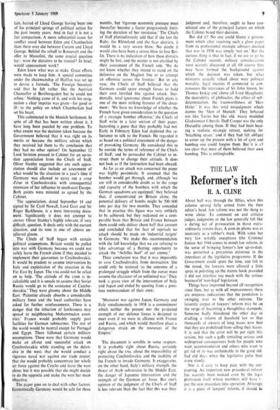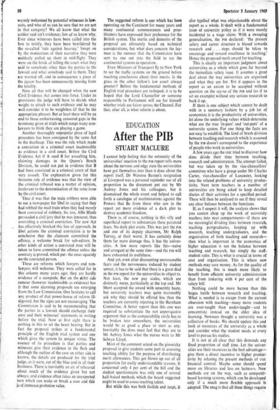Reformer's itch
THE LAW R. A. CLINE
About half way through the 'fifties, when this column sprang fully armed from the then editor's head, law reform was not the thing to write about. To comment on and criticise judges, judgments or the law generally felt like a daring act of provocation in those extra- ordinarily remote days. A nom de plume was as necessary as a robber's mask. With some but very few notable exceptions (the Criminal Justice Act 1948 comes to mind) law reform, in the sense of bringing lawyer's law up-to-date, was permitted a precarious existence in the interstices of the legislative programme. If the Government could spare the time, and felt in the mood, the lawyers were allowed a little spree in polishing up the statute book provided it did not interfere too much with the serious business'bf 'non-legal' legislation.
Things have improved beyond all recognition since then, but as with all improvements there are ominous indications that the pendulum is swinging over to the other extreme. The leisurely output of lawyers' reform may be on the verge of becoming a thoughtless stampede. Someone badly blundered the other day in drafting a reform of leasehold law so that thousands of owners of long leases now find that they are prohibited from selling their leases. It is said that the error will be put right this session, but such a gaffe (entailing serious and widespread consequences both for people who want accommodation and others who want to get rid of it) was unthinkable in the good old, bad old days when the legislative pulse beat more slowly.
Nor is it easy to keep pace with the out- pouring. An important new procedural reform has scarcely been noticed even by the legal profession itself whose members will have t'. put the new procedure into operation. Although it is a piece of lawyers' reform, it should be warmly welcomed by potential witnesses in law- suits, and who of us can be sure that we are not
in that category? We all know that what the soldier said isn't evidence; few of us know why. Ever since witnesses have been called into the box to testify, they have been bewildered by the so-called 'rule against hearsay.' Swept on by the momentum of their narrative they were suddenly pulled up short in mid-flight. They were on the brink of telling the court what they said to somebody other than the parties to the
lawsuit and what somebody said to them. They are warned off, and in consequence a piece of the jigsaw has been unnecessarily missing from the totality.
Now all that will be changed when the new Civil Evidence Act comes into force. Under its provisions the judge will have to decide what weight to attach to such evidence and he may
well consider it to be weightless (if that be the appropriate phrase). But at least there will be an
end to those embarrassing, censored gaps in the testimony given at trials which tempt many non- lawyers to think they are playing a game.
Another thoroughly unpopular piece of legal procedure has been consigned by the same Act
to the dustheap. This was the rule which made a conviction in a criminal court inadmissible as evidence in a civil court. Before the Civil
Evidence Act if A sued B for assaulting him,
claiming damages in the Queen's Bench Division, he could not put in evidence that B had been convicted in a criminal court of that very assault. The explanation given for this tiresome rule of evidence was that the view of the criminal tribunal was a matter of opinion, irrelevant to the determination of the same issue by the civil court.
Thus it was that the train robbers were able to sue a newspaper for libel in saying that they
had robbed the mail train when they had merely
been convicted of robbery. So, too, Alfie Hinds persuaded a civil jury that he was innocent, thus
overriding a criminal conviction. The new Act has effectively blocked this line of approach. In libel actions the criminal conviction is to be conclusive that the claimant committed the offence, a welcome break for sub-editors. In other kinds of action a convicted man will be taken to have committed the offence unless the contrary is proved, which put:the onus squarely on the convicted person.
These are reforms which lawyers and non- lawyers will welcome. They were called for in this column many years ago; they are hardly evidence of a stampede. But on the debit side rumour (however inadmissible as evidence) has
it that some alarming proposals are emerging
from the Law Commission. One hesitates to call any product of that power-house of reform ill- digested, but the signs are not encouraging. The Commission is said to be recommending that the parties to a lawsuit should exchange their own and their witnesses' statements in writing before the trial. Now at first sight there is nothing in this to set the heart beating. But in fact the proposal strikes at a fundamental principle of the English trial system and one which gives the system its unique virtue. The
essence of its procedure is that parties and witnesses give their evidence in the flesh and although the outline of the case on either side is known, the details are produced for the trial judge, as it were, out of the blue and in all their freshness. There is inevitably an air of rehearsal about much of the evidence given but not always; oral evidence often takes an unexpected turn which can make or break a case and this is of immense probative value.
The suggested reform is one which has been operating on the Continent for many years and many continental commentators and prac- titioners have expressed their preference for the British system. The merits and demerits of the proposal are ultimately based on technical considerations, but what does concern the lay- man is the rumour that the Commission have sent no one out into the field to see the continental systems in operation.
Even Ministers of Transport fly to New York to see the traffic systems on the ground before reaching conclusions about their merits. Is the grass in the other fellow's law court always greener? Before the fundamental methods of English trial procedure are reshaped, it is to be hoped that the Lord Chancellor or someone responsible to Parliament will see for himself whether trials are fairer across the Channel. For that, after all, is what reform is about.



































 Previous page
Previous page